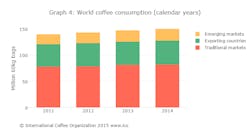Coffee Prices Settle Lower As Focus Turns To Upcoming Year, ICO Reports
November saw mounting speculation over the size of the next 2016/17 Brazilian crop and its impact on the global supply/demand balance, the International Coffee Organization (ICO) reported in its Nov. 2015 Coffee Market Report. In general, prospects for Brazil seem positive, although there is some concern over the conilon crop. Prices showed little clear trend, but ended the month down by nearly 3%, as commodities more broadly were subject to currency fluctuations, with coffee most prominently affected by the Brazilian real. In terms of ICO figures, production for crop year 2014/15 is pegged at 143.3 million bags, while consumption in calendar year 2014 has been revised upwards to 149.8 million bags, due to higher than expected demand in the European Union.
The monthly average of the ICO composite indicator price dropped by 2.9% to 115.03 US cents/lb, its second-lowest level in nearly two years. The daily price ranged from a high of 118.30 cents to a low of 110.45, its lowest daily price since January 2014. The exchange rate of the Brazilian real stabilized slightly, but the ongoing strong export levels from Brazil maintained negative pressure on the coffee market.
In terms of the group indicators, the monthly average of all four ICO groups settled lower, with the heaviest declines in the three Arabica groups. Colombian Milds, Other Milds and Brazilian Naturals fell by 3.1%, 3.4% and 3.5% respectively, while Robustas were 1.3% lower. The arbitrage between Arabica (on the New York futures market) and Robusta (on London) narrowed by 11.1% to 50.31 cents, which should provide some support to Arabica prices moving forward.
Total exports in October 2015 came to 8.7 million bags, 3.6% less than October 2014. This decrease was mostly attributable to lower shipments of Robusta, which anecdotal reports suggest is a reaction to the low prices, particularly in Vietnam.
Exports from Brazil were also slightly lower compared to October 2014, but still recorded their highest volume in the last twelve months, starting coffee year 2015/16 with exports of 3.2 million bags. The 36.9 million bags exported in coffee year 2014/15 was a record for Brazil, despite the lower production figures, suggesting that significant volumes of domestic stocks have been used to fuel the market.
In the absence of further information, production in Vietnam in 2014/15 has been maintained at 27.5 million bags, comprising 95% Robusta. However, exports from Vietnam were estimated at just over 20 million bags in coffee year 2014/15, 19.2% less than the previous year. Taking into account a domestic consumption of around 2 million bags, this suggests a significant Robusta stock buildup, which has yet to come to market. Looking ahead to 2015/16, the Vietnamese coffee authority Vicofa have indicated that they expect production to drop to 18 million bags, as lower prices reduce the incentive for farmers to invest in their trees. This contrasts with the recent USDA forecast of 29.3 million bags.
Turning to consumption, the world total for calendar year 2014 has been revised upwards to 149.8 million bags, representing an average annual growth rate of 2.4% over the last four years. This revision is due to higher than expected demand in the European Union, which is now estimated at 42.4 million bags. Consumption in Brazil, on the other hand, has been revised down by 500,000 bags.
